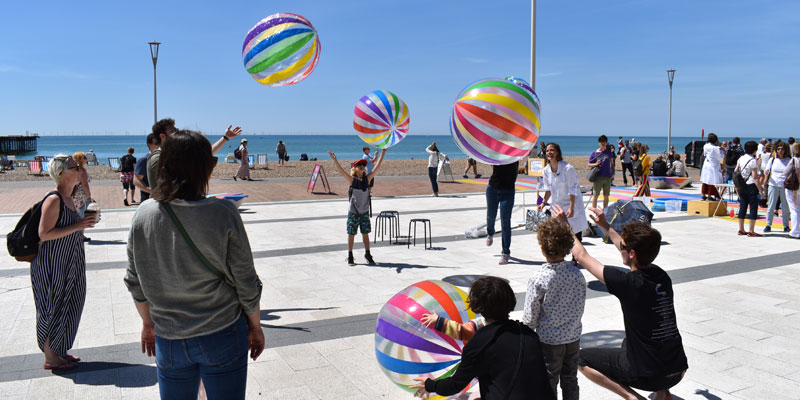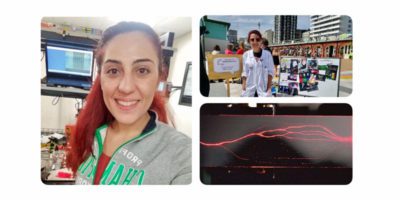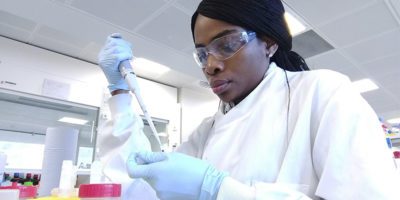Dr Beth Nicholls is a UKRI Future Leaders Fellow specialising in bee behaviour and pollinator conservation at the University of Sussex, where she is currently researching foraging behaviour of bees. She is passionate about science communication and encouraging young people into STEM careers, particularly those from groups that are currently under-represented in the science community. Beth leads the Soapbox Science Brighton co-ordinating team.
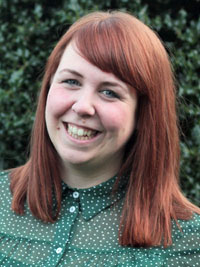
Beth is leading the co-ordinating team for the Brighton Soapbox Science digital event, which takes place on Wednesday 14th June 2021 at 10am. This year the event is being run as part of the The University of Sussex Access Programme, designed to help students manage their transition to higher education. Any student in Year 12 or above who is considering university can sign up to the Sussex Access Programme. Once registration is completed, they can register for this event and many others. More details are available on the website.
Understanding animal behaviour
Ever since I was a little girl, I’ve always had a real interest in nature and wildlife, and I never really grew out of that. I went to Bangor University in North Wales to study environmental biology and during that, I became really interested in animal behaviour, and specifically insect behaviour. So, I went on to do a master’s degree in animal behaviour at the University of Exeter, and then I was lucky enough to get a PhD position there.
My PhD focussed on the foraging behaviour of honeybees and bumblebees, and how they decide which flowers to collect pollen from, because no one had really looked at how bees assess the quality of pollen. Then I moved to the University of Sussex to work on more applied research, investigating the impacts of disease and pesticides on bee physiology and behaviour in the lab of Dave Goulson.

(You can read Beth’s previous piece for Womanthology here.)
In support of bees
Now I’m back at Sussex after a short break working for the South Downs National Park, working the mechanisms underpinning pollen foraging decisions in bees, and how that can inform the design of agri-environments, and the sustainable improvement of crop yields through more effective pollination, rather than increasing pesticide use or other inputs such as fertilisers.
My PhD was very ‘blue-sky’ research, which is incredibly important of course, but at the time everyone was saying to me “All the bees are dying, what are you doing about it?” So, the topic really piqued my interest and I was looking for a way to tie my two interests in behaviour and conservation together. I feel really fortunate that with my UKRI Future Leaders Fellowship I can now do that.
Capturing people’s imaginations

The primary aim of the events is to engage with and capture the imaginations of people who wouldn’t normally go to a science event, who maybe don’t have any pre-existing interest in science or research. Our soapbox scientists do that in quite a bold way using interactive props and eye-catching demonstrations to convey how exciting the science is.
A well-oiled machine
We have a really great team coordinating the event each year, but recently we’ve had a few changes, as my co-organiser has left Sussex for an exciting new position elsewhere and our volunteer co-ordinator is currently on maternity leave. Obviously, it’s also been a bit of a strange year because of COVID as well, but generally we’re quite a well-oiled machine!
We have one person who looks after the speakers and keeps in contact with them to make sure they feel prepared for the event. We have others who look after the volunteers who kindly come along on the day to support the speakers, someone to look after the funding and expense claims, and our social media and communications expert Jess Gowers does a lot of hard work promoting the event.
We all have a role to play and I think we work really well as a team. We’re cross-disciplinary too, so from people from different scientific fields and job roles from across Sussex university.
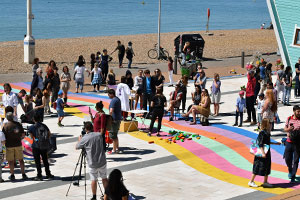
COVID won’t keep us down
Last year, our event was cancelled due to Covid. We really wanted to give the scientists an opportunity to speak this year, and as a team, we thought really hard about how we could adapt the event and still keep that original central aim of engaging people that wouldn’t normally go to a science event, and certainly wouldn’t normally go to a science event online.
So, we decided to partner with our excellent widening participation team at the University of Sussex who work with schools and colleges in the South East, encouraging young people, particularly first-generation students or those from disadvantaged backgrounds, who perhaps don’t have anyone else in their family who’s gone to university before, to consider pursuing a degree.
Widening participation usually run events on campus for those young people aimed at demystifying universities, and they also run events for parents as well to help them understand what it’s all about and how funding works etc. So, we decided to tie in the event with their new Access Programme to ensure we will be reaching our target audience of people who typically don’t engage with scientific events.
I think that was a really good decision on our part. Hopefully, we’ll still get a large audience but targeted at the people that Soapbox Science is aiming to reach.
Our Soapbox Scientists and their talks this year are:
Louise Davidson: “Working together to save lives” (Psychology)
Hadia Almahli: “A research trip in natural products synthesis” (Chemistry)
Dannielle Cox-Pridmore: “Flexible Bioelectronics: The Future of Drug Testing” (Engineering)
Charanjit Kaur: “How to Search for Needles (BSM Signals) in a Haystack (LHC Data)? A Novel Analysis Strategy Using Machine Learning” (Physics)
Noora Nevala: Title TBC (Neuroscience)
Gender balance in biological sciences
At the undergraduate level, biological science degree courses are well balanced, or maybe even balanced more towards women in ecology and biology. I used to teach in a psychology department as well, and those degrees were very biased towards women, but then as you get into more senior roles of lecturer, and certainly professor, the representation of women really drops off.
There’s a lot of job uncertainty in academia, particularly when you’re a post-doc dealing with short term contracts and a lack of maternity cover. This arises often because the funding we have for our research tends to be very time-limited. It’s not necessarily the most welcoming environment for people who may want to start a family during this time.
It is also really depressing that, while the gender gap is starting to close, COVID will probably set things back because promotions, permanent positions and fellowships are all based on writing papers and funding bids, and if you’re just struggling to get your day-to-day work such as teaching done around caring responsibilities, it’s going have a massive negative impact on those outputs on which you’re being assessed for future jobs.
I think things are changing though, and I’m hopeful that funding bodies and employers will take into account the massive impact of COVID, and the fact that its effects are not equal across everyone in the sector.
About Soapbox Science Brighton 2021
This year we’ve split our speakers into two sessions. The first session called Saving lives with science is all about how science feeds into medicine and the emergency services. We have a scientist speaking about using products found in the natural world to produce medical drugs, such as chemicals found in plants like foxgloves. We’ve also got scientists talking about how understanding the psychology of emergency responders can help to improve the number of lives saved.
Then, in the afternoon, our session is called Through the lens. We’ve got a physicist talking about using machine learning to search for signals in data from the large hadron collider and neuroscientist speaking about fish vision.
For me personally, I’m excited to be starting my own research group at the moment, thanks to my UKRI Future Leaders Fellowship. I’m really excited to have several new members of my team start this year, and to be collaborating with neuroscientists at Sussex to learn more about the sensory system of bees.
https://www.linkedin.com/in/elizabeth-nicholls-53584451
https://profiles.sussex.ac.uk/p339798-beth-nicholls

